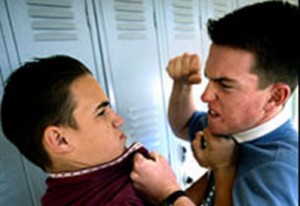 Nobody likes bullying except the bullyer, but it’s always been with us (people do it, chimpanzees do it, birds do it), and I can’t see how it will ever go away. Bleeding heart liberal idealists are always whining about this and that and asking, “Why can’t we just blah, blah, blah?” Don’t get me wrong, I’m fairly overweight when I step onto the “liberal scale,” but I’m more of a realist than an idealist. As I look at the world around me, I try to understand how it works, how it’s worked in the past, how it could work in the future (and how it’s unlikely to work in the future), and why. It’s that understanding of why that seems to separate the realists and the idealists. Realists use the word why to mean the reason why things are a certain way (and probably will stay that way, or will probably change). Idealists use the word why as an interrogative complaint about how things are vs. how they wish they would be. We need both types (even within the same person), because a realist mindset tends to make things work, and an idealist mindset tends to change the way things work. Both are good, but neither are always appropriate or useful.
Nobody likes bullying except the bullyer, but it’s always been with us (people do it, chimpanzees do it, birds do it), and I can’t see how it will ever go away. Bleeding heart liberal idealists are always whining about this and that and asking, “Why can’t we just blah, blah, blah?” Don’t get me wrong, I’m fairly overweight when I step onto the “liberal scale,” but I’m more of a realist than an idealist. As I look at the world around me, I try to understand how it works, how it’s worked in the past, how it could work in the future (and how it’s unlikely to work in the future), and why. It’s that understanding of why that seems to separate the realists and the idealists. Realists use the word why to mean the reason why things are a certain way (and probably will stay that way, or will probably change). Idealists use the word why as an interrogative complaint about how things are vs. how they wish they would be. We need both types (even within the same person), because a realist mindset tends to make things work, and an idealist mindset tends to change the way things work. Both are good, but neither are always appropriate or useful.
The idealist in me has always wanted to get along with everyone, not rock the boat (unless everyone in the boat enjoys having it rocked…). I grew up mostly in the 1960s, so I was definitely of the “make love not war” religion (but that’s another subject entirely…). I’ve also always been an independent cuss: I don’t like being told what to do, how to behave, what to believe, or much of anything else. It’s made for an interesting balancing act: trying to get along and be accepted and getting the approval of others, while at the same time doing my own thing, not following the crowd, standing alone. In high school, I knew and was friendly with a lot of kids, but I was friends with very few. I had two or three fairly good friends, and my girlfriend Sharon (now my wife of 37 years) had two or three fairly good friends, but I was friendly with most of the kids in the school.
The ones I was not friendly with were the jerks, the jocks (except some of them) and the bullies. Mostly we just ignored each other, and I was fine with that. They weren’t going to change me, and I knew I wasn’t going to change them and had no desire to do so. But sooner or later, you’re in the wrong place at the wrong time. I’ve always been what could be generously termed as ‘slender.’ I weighed about 115 as a freshman, and by the time I graduated I was 145 and just a half-inch shy of six feet. A strong wind could have blown me away if I’d had enough of a cross-section for the wind to get a hold on. I was on the wrestling team all four years, but mostly because I thought at the time that everyone should do some sport or activity, and I didn’t care for football or basketball, and both of my older brothers had wrestled before me, so why not? I was wiry, strong for my weight, had quick reflexes, but most of the time you wouldn’t know it just looking at me.
One day Sharon and I were standing in the hall during lunch or between classes. Suddenly, I found myself shoved up against the lockers with the collar of my shirt being steam-pressed by the fist of a bullying jerk a few inches shorter than me while a couple of his buddies crowded in on either side. To this day, I have no idea why they chose to pick on me at that moment, and I can’t recall what he said as he pressed me against the lockers. It was the first and only time I was ever bullied like that, so it took me quite a bit by surprise. But I knew how to behave. I don’t know if it was from being the youngest of four kids in my family and having grown up having to defend myself against older siblings, or whether it was from all the books I’d read and all the movies I’d watched, or if it was from the things I’d been taught by my folks and uncles and aunts and teachers, or if I just inherently understood the situation and the “personality dynamics” of the situation. It wasn’t from watching John Wayne movies, or I’d have shoved back and started swinging. I didn’t want to fight, but I knew that whining, “Let me go, please, let me go!” was not the right thing to do. I knew that only strength of will and determination not to be pushed around would end the situation in an acceptable (to me) fashion. I didn’t think about it in words, I just knew.
I stared straight into the kid’s eyes and, in as steady and commanding of a voice as I could manage, I said, “Let..go..of..my..shirt.” The kid just held onto my shirt, pushing upwards. I became aware of Sharon standing close by saying, “Don’t fight, don’t fight,” over and over. I knew that was the wrong behavior, it was like standing around a campfire waving an open jar of gasoline over the flames. I turned my face towards her and uncharacteristically said, “Sharon. Shut up!” then turned back to the bully, again staring him straight in the eyes and, speaking levelly, slowly and forcefully, said, “Let..go..of..my..shirt.” After a moment, he let go, shrugged, made some sarcastic remark, and turned and walked away. He never bothered me again, and that’s the only instance I can remember of ever being a participant in bullying. I’m not a big fan of macho, but in a moment like that, I’m convinced it was the only appropriate response. Others might (and frequently do) choose differently. The idealist in me didn’t want to fight. But the realist in me knew that cringing was not a good solution either. The me in me found the solution that worked best for me, avoiding the fight while preventing any future continuation of the bullying.
Would I have fought? Damn right. But I wasn’t going to take the first swing. Was I scared? Probably some, but mostly it was just adrenaline rushing to places that didn’t need it. Was I brave? Looking back, I don’t think so. I’m pretty confident that I could have “taken him” if shove had come to push, and I think he realized that he might have grabbed the wrong nerd that time. Mostly it was just the me in me refusing to be told what to do, how to behave. I refused to be forced to cringe and whine. I refused to be forced into starting a fight.
Looking back at my life so far, my two driving personality characteristics have been an overwhelming need to be accepted, approved of, admired, and a burning need for self-control, control of myself both from within and from without. Those two have set up a sometimes stressful dynamic, as being accepted and approved of can frequently be at odds with being independent from control by others. And that need for acceptance and approval is kind of like being an alcoholic: every ‘hit’ only lasts for a little bit, and then you need another and another and… Fortunately, with age, I’ve learned to provide myself with most of the approval and acceptance that I need, and not demand it from others quite so much.
Of course, that’s just satisfying my need for self-control. Some days, you should just stay in bed.
Blogically yours,
Everett
July 1, 2012



